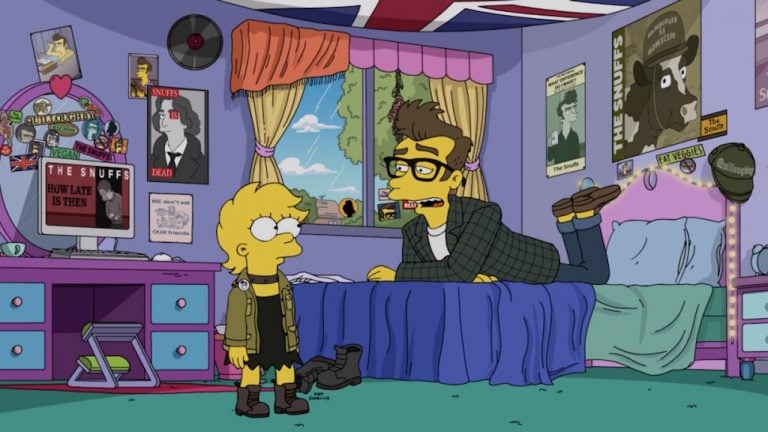Over the weekend, The Simpsons aired ‘Panic On The Streets Of Springfield,’ an episode that poked fun at our fallen jangly-pop hero Morrissey.
‘Panic On The Streets Of Springfield’ saw Lisa fall in love with fictional band the Snuffs and their pompous lead singer Quillougby — voiced by none other than the deliciously proper Benedict Cumberbatch (Sherlock). The episode parodied Morrissey’s decline from moody, charming leader of the greatest pop act of the 80s, to far-right foghorn.
Morrissey has been subjected to criticism over the past few years for vocalising support for “For Britain”, a far-right anti-Islam political party, during a 2019 appearance on Fallon.
The episode, which was one of the best the declining series has put forward in years, featured music penned by Flight of the Conchords’ Brett Mackenzie.
Morrissey has since released a lengthy statement, dubbed “Hello Hell”, responding to the episode. He is, naturally, quite sulky about the whole affair.
“The hatred shown towards me from the creators of The Simpsons is obviously a taunting lawsuit, but one that requires more funding than I could possibly muster in order to make a challenge,” he wrote. “Neither do I have a determined business squad of legal practitioners ready to pounce.”
Morrissey went on to allege that the modern music landscape does not allow for free speech, whilst painting himself as a martyr of feelings.
Love Music?
Get your daily dose of metal, rock, indie, pop, and everything else in between.
“There is no place in modern music for anyone with strong emotions. Limitations have been placed on art, and no label will sign an artist who might answer back,” he continued. “The world in general, has become a mesmerizing mess, and we must let it go spinning along unbearably because free speech no longer exists. We all know this. In my case, nothing about my life has ever been matter-of-fact; nothing about my songs has ever been matter-of-fact … so why would they now be? Since my very first interview several decades ago I have lived with horrible accusations to such a degree that it is generally understood that “this is how we write about Morrissey.” In other words, I’m quite used to it. I’ve had enough horror thrown at me that would kill off a herd of bison.”
Morrissey continued, “Accusations usually come from someone with a crazed desire for importance; they don’t operate at a very high level. Writing for The Simpsons, for example, evidently requires only complete ignorance.
“But all of these things are too easy for me to say. In a world obsessed with Hate Laws, there are none that protect me. Often, the scandal sheets (do we STILL refer to them as “news” papers?) attempt to psychologically wound an artist, and then, hopefully stir up enough hatred against that artist so that s/he is physically wounded. False theories of race are now the most common (and boring) aspect of all criticism, and will continue to be so until accusations of racism are in themselves illicit.”
The singer went on to imply that he has witnessed The Smiths fans smeared by media in the UK.
“I have watched “Smiths fans” being attacked by the UK press on the grounds that “Smiths fans” are too backward to understand the person that I am; I have watched the modern Morrissey audience be ridiculed by the UK press with the belief that they, too, couldn’t possibly know who I am, and I have lost several high-profile friends because they could no longer live with the night and day harassment from British journalists who are suicidally anguished because they cannot urge the people around me to drum up tell-tale incidents of racism.
“This battle fatigue I face alone, although I am very grateful to the writer Fiona Dodwell for her eloquent appraisals of the victimization that now automatically associates with my name, and on which The Simpsons latest episode feasts.”
He concluded, “People continually ask me why I do not retaliate — especially following the Sky Sports open slander. The answer is explained in the first few lines of this comment.
“Life is difficult and you must face it on your own, and even with the impossible-to-imagine legal artillery, everything can be repaired … except the human heart.
It is easier for me not to go on. You know I couldn’t last.”

































